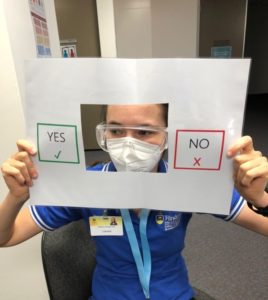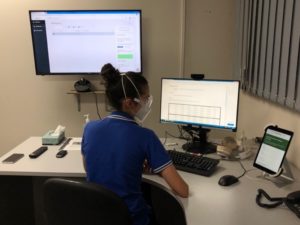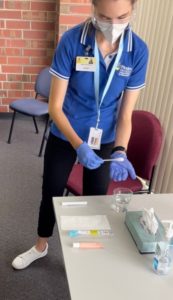Hi! I’m Lauren, Just a 4th Year student studying the Bachelor of Speech Pathology.
Many people think that speech pathologists just fix people’s lisps and stutters, which we do, but we also are involved with a whole lot more! We can work with infants helping them with their feeding, and children who are non-verbal, have phonology and sound difficulties or food aversions. Then on the other end of the scale, we work with adults who have had a stroke, or have dementia or Parkinson’s where we help them with swallowing, or communication difficulties. Speech Pathologist can work in private clinics, for the Department of Education, in schools, hospitals, and nursing homes. As you can see, speech pathologists have a diverse range of practice, and this is one of the reasons I decided to pursue this career.

It has been a privilege to learn about all these different areas and gain hands-on experience through placements which has led me to where I am today – on an 8-week rural placement in Whyalla. I was initially really nervous as I would be quite far away from my family, and this was my first adult placement in a hospital setting. I was scared I would be out of my depth and not be able to effectively apply what I have learnt from my studies into the clinical setting. However, I quickly learnt I had nothing to worry about. My placement educators were very supportive and didn’t expect us to be seeing clients by ourselves in the first week – after all this is our first experience working in this context. I have gradually grown in confidence and with that, our educations have given us more responsibility.

I have had the opportunity see clients in various contexts such as during home-visits, on the wards, and in telehealth sessions. I have worked with clients who have had a stutter, a facial droop following a stroke impacting their ability to move their lips to speak clearly, and cognition difficulties. One particular patient which stood out to me was an older gentleman who was in his late stages of Parkinson’s and dementia. This patient was non-verbal and I trialled an augmentative and alternative communication (AAC) device, which was yes and no written on a piece of paper. The aim for the client was to look at the appropriate side to answer yes/no questions. While we weren’t successful in this method of communication as the wife knew the patient so well and could understand his needs, it reiterated the importance of making communication functional for patients.
There’s no doubt that COVID has significantly impacted my placement. I have had to wear masks and goggles 24/7, and gowns and gloves with high-risk patients. This has made it difficult to demonstrate tasks to clients as all our therapy evolves around the mouth which is covered by a mask. Majority of our clients have been seen through telehealth contexts which poses its own set of difficulties. These challenges have taught me to be flexible, patient and accept that some things that are out of my control.

Through this placement, my skills have grown exponentially and my passion for this field has flourished. I have developed a greater understanding of how speech pathologists work so closely with other allied health professionals and how much of an impact we can have in aiding successful communication and swallowing. This placement has been very rewarding, and I am excited to get out into the field myself at the end of this year.
Lauren Hoopmann
4th Year Speech Pathology – Honours

